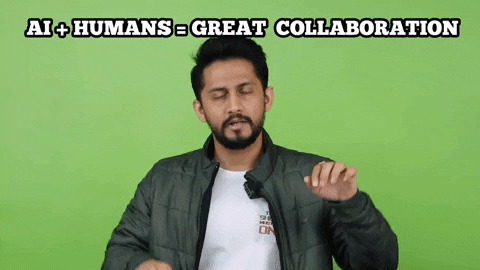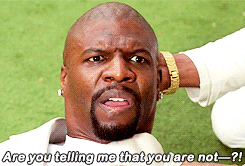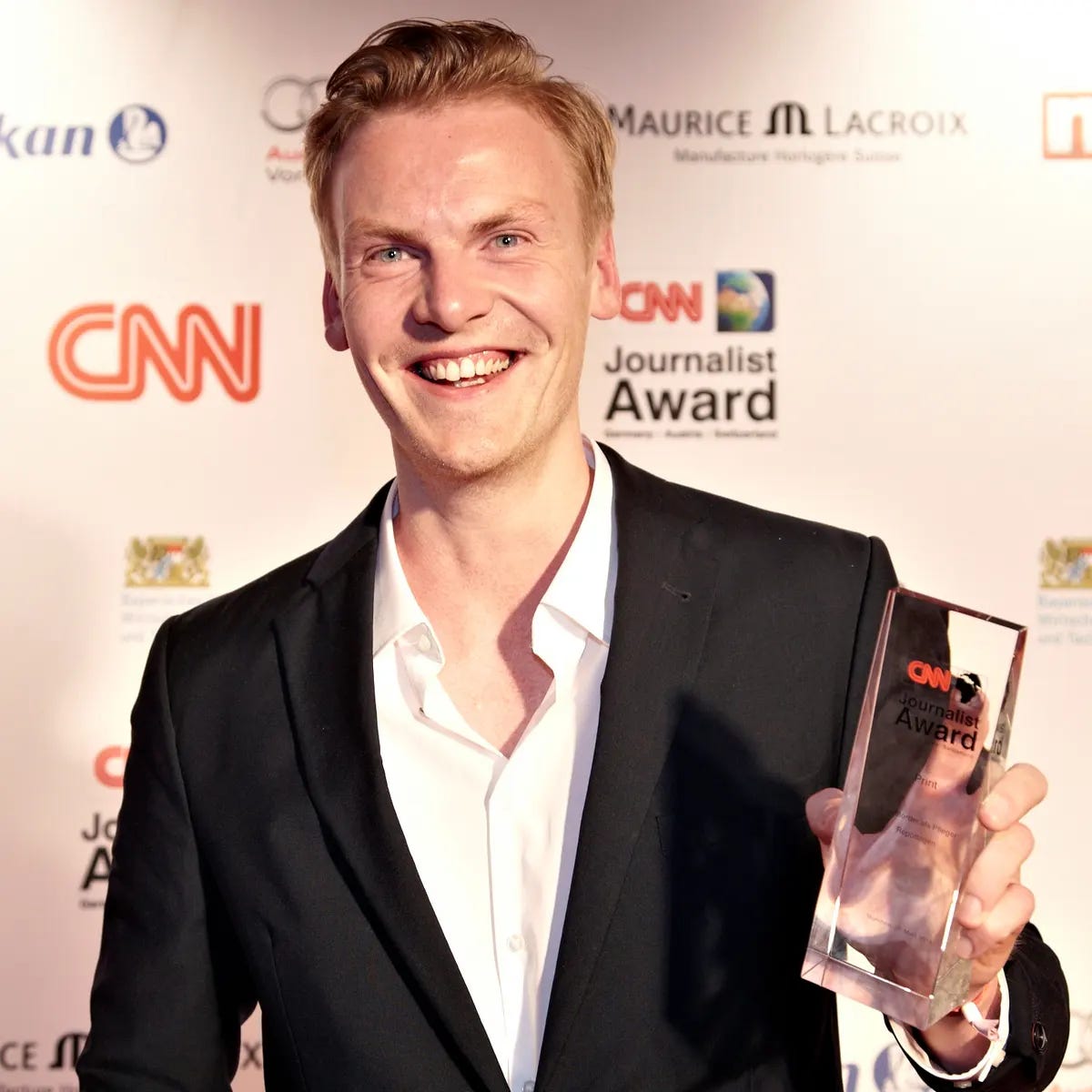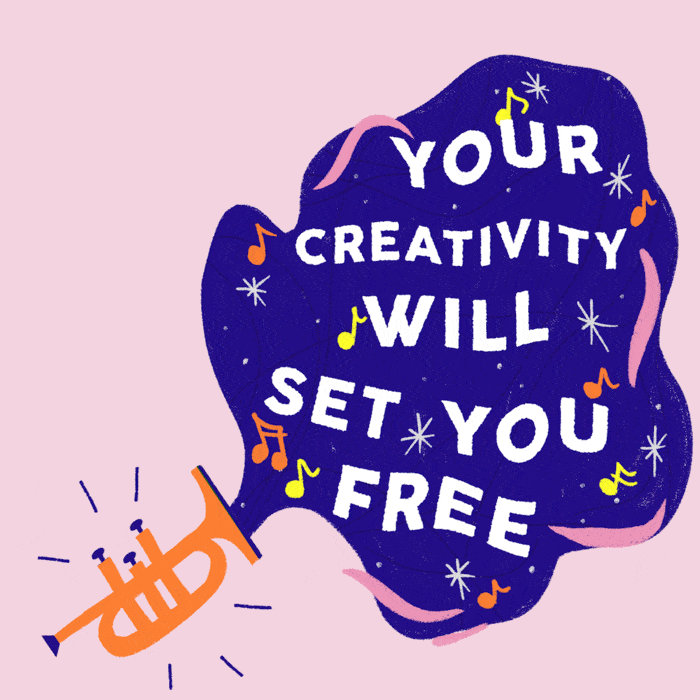Have I got news for you? No, but AI does
As the EU AI Act finally gets the green light, OpenAI announces a partnership with German media and publishing giant Axel Springer. And that's big news.
It’s finally Christmas time, well almost, and in any case it is for the newsletter as it’s going on a well-deserved break until January.
I started this newsletter back in March on LinkedIn as a spin-off of an internal newsletter and keeping an eye on the tech news, in particular all things AI, has been increasingly challenging as tech innovation has moved at lightning speed this year.
From the launch of ChatGPT4, Apple VisionPro and spatial computing, multimodal AI, and the future of the metaverse (or virtual worlds), not to mention the conversations around how to regulate a technology that has capabilities we may not even be aware of yet and where’s the right balance between putting safety first without compromising innovation and the potential for good of AI.
This has definitely been the year of AI (with the permission of Taylor Swift) and I have a feeling we’re just getting started as now we also have to worry about superhuman AI. Oh dear.
In fact, this week the announcement of the partnership between OpenAI and Axel Springer, one of Europes’s largest mass media publishers and owner of Bild, Die Welt, Business Insider and Politico, is more relevant than you may think for a number of reasons.
To begin with this year The New York Times, CNN, Reuters and The Guardian have all taken measures to block OpenAI tools from using their content to train AI-models. The motivation was not only to protect the intellectual property and copyright of content produced by these media outlets, but also the concerns around the potential increase of mass disinformation due to the way AI tools can rapidly build and are able to produce text, images and voice in a human-like manner.
The decision from Axel Springer is a departure from the position taken by similar media outlets in regards to generative AI. Interestingly enough, at the beginning of this year Axel Springer was among those publishers expressing their concerns around the future of legacy media in the age of AI as the company was cutting jobs at the time.
Axel Springer CEO Mathias Doepfner both urged his staff to focus on investigative journalism and original commentary and at the same time claimed that “artificial intelligence has the potential to make independent journalism better than it ever was – or simply replace it,” as per an internal letter to staff reported by The Guardian. Far from being a cynic, Doepfner was alluding in its letter to the challenges that traditional publishing faces in the age of AI and how driving engagement -and with it revenue- is key for is survival, for which he was exploring the idea of using AI tools in order to keep up with the times.
And this is indeed where the OpenAI partnership comes to the rescue as they have agreed to pay Axel Springer for having access to content -even articles published behind a paywall- that can be summarised for ChatGPT users in responses to prompts. The deal is non-exclusive on either part, but it gives Axel Springer a new source of income while granting OpenAI the holy grail they were looking for: updated content they can use to train their model.
But the partnership between OpenAI and Axel Springer is extremely significant for another reason. AI-models train their output based on the input they receive which has led some to question whether Bild and Die Welt, two of the brands own by Axel Springer, are the best source of input and whether training ChatGPT on them could lead to a right-wing bias.
Additionally, in recent years we’ve seen the rise of fake news and dissinformation, but we had yet to read whole articles written in full by AI while we thought a human was behind them. Or that was the case until the CEO of Sports Illustrated was fired last week after it was revealed that the magazine had published several articles under fake authors’ names and pictures, which have been revealed to be AI-generated.
The issue is not that Sports Illustrated used AI for this content. The problem is that they pretended they did not and even went to the extent of creating fake identities for non-existing journalists to give the AI-generated content a varnish of human authenticity. This content was presented as the output of a real person when it was far from being the case.
That is where the concern about the use of artificial intelligence for content creation, particularly news, comes from and the reason why it is important to disclose whether AI has been used in the process. We have a right to know what the information we are reading comes from. Even Amazon has limited the number of books authors can self-publish to contain the proliferation of AI content on kindle. Although at 3 per day I wonder how many people are so naturally prolific.
It is undeniable AI can be a useful tool for objective reporting that is time-sensitive (for instance, live results for games or summarising in real time headlines from press conferences), but we still need to know how that content has been created and from where.
On this note allow me to play devil’s advocate just for fun and remind you of a story that captured my attention in 2018, when award-winning German journalist Claas Relotius was unmasked by another journalist and had to admit he had “made up stories and invented protagonists” in at least 14 out of 60 articles that he had contributed to Die Spiegel online and printed editions. This was a real human behind the stories published under his name, and yet he opted for fabricating them and mixing fact with fiction, which can work amazingly well in literature, but is a recipe for disaster in journalism, which is based on truth and facts.
Perhaps a good example to follow would be The Guardian, which has been named news provider of the year for 2023 at the annual British Journalism Awards. The judges have praised the newspaper on their commitment to investigate “difficult truths from its own past while delivering a mass audience and achieving financial sustainability.”
Good journalism and quality information matter -and readers are willing to pay for it- as they understand the it importance of having real people discussing and reporting accurately on what is happening in our world, big or small. If we can’t tell what’s real from what is not, the future will be in the hands of savvy manipulators, such as Google and their hands-on Gemini demo, which has turned out to be a lot less exciting than it seemed on first impressions. It was too good to be in real time, let’s be honest.
And before I stop talking about artificial intelligence -at least until 2024- it seems that after hours of negotiations the EU has finally reached an agreement on the EU AI Act, that was threatened last minute by the opposition of France, Germany and Italy.
However, this agreement is only the first step towards implementing legislation, which may prove trickier than initially expected now that we know the main economic powers in the union will try to protect their shining AI stars so they can remain competitive at a global scale, unhindered by EU-bound regulation, especially around foundation models, as I discussed here.
Not to mention that from saying to fact there’s a long way, and while the EU AI Act is a good attempt to offer a regulatory framework for AI, with a focus on enforcing safety while supporting innovation and good uses of AI, the technology keeps moving at lighting speed and by the time any legislation is eventually implemented - we’re talking not before 2026- it may be no longer fit for purpose for the uses and applications of AI at that time.
This has also been a fantastic year for London, which has consolidated its position as a global tech hub with more unicorns than any other city in Europe and it is the most developed VC ecosystem in Europe and one of the 10 most developed tech ecosystems in the world. Not surprisingly at London & Partners we have helped 100 international businesses land in the capital in 2023.
More importantly this has been the year where Creative Industries have finally taken centre stage and received the attention they rightly deserve as new data have contributed to showcase the economic value of Creative Industries to the economy. And because a lot has happened in the past 12 months, allow me to gush for the next couple of paragraphs on how Creative Industries are booming and helping the UK economy grow.
As stated by the PM Rishi Sunak in his opening speech at London Tech Week in June this year, the creative sectors have grown at twice the rate of the wider economy since 2010, generating approximately £115.9 billion for the economy (nearly a 6%), and providing over two million jobs.
The positive economic impact of the creative sector in London has been reinforced by the London's Creative Industries - Sector Deep Dive, a report from the Mayor of London which shows not only that most sub-sectors of the UK’s creative industries have recorded higher than average growth between February 2020 to June 2023, but also that London contributes over half of the UK’s creative industries economic output, with 1 in 5 people working in creative jobs in the capital and with employment in creative sectors expected to grow with 1.2 million jobs in the next decade.
This is the year when we’ve read about Warner Bros. Entertainment announcing the expansion of their Leavesden site in the UK, which will potentially create 4,000 jobs, but also the year of the launch of Digital Catapult and Target3D UK's first network of Advanced Media Production studios that will link London and the North East thanks to 5G.
We’ve learned that people in the UK love music (and in fact UK gig-goers spent £2bn on tickets in 2022 - up 23% on pre-pandemic figures) and that people outside the UK love British TV (with UK TV exports reaching a record £1.853 billion in 2022-23 - a 22% year-on-year increase, with 53% of programmes sold to international streaming and video-on-demand platforms, up from 39 per cent last year), which in turn contributes to drive screen tourism from overseas visitors.
We know that the UK art market directly supported 45,520 jobs and 7,800 businesses in 2023, and that the impact of the UK arts sector was worth £49bn to the economy in 2022, while videogame spillover technology was worth £1.3 billion in 2021 for non-gaming industries and exports of advertising and marketing-related services from the UK to overseas markets have grown from £7.1 billion in 2016 to £15.6 billion in 2022.
And thanks to the British Film Institute and the Creative Industries Policy and Evidence Centre (Creative PEC) we also know the social value of cinemas is equivalent to £600,000 per cinema every year, amounting to £5.18 million over 10 years.
Tech News
After its summer UK launch, Threads is now available in the EU
TikTok under investigation by Ofcom over inaccurate data
Epic Games has won their antitrust legal battle against Google
Phone, broadband and pay-TV companies will be banned from imposing inflation-linked price rises in the middle of a contract.
Creative News
Research from BFI identifies the digital content production skills that need to be developed within the UK workforce for the UK to lead on animation, post-production, video games, VFX, and emerging tech.
Music Technology UK, a new music association, has launched this month offering free membership to music-tech startups with annual turnovers of less than £250k.
Netflix reveals viewing numbers for its shows and films for first time.
Believe it or not, a campaign has launched to create a Museum of the Prime Minister.
And guess who’s been at Parliament giving evidence on the economics of music streaming? Nile Rodgers. Those DCMS people really got lucky…
Last but not least
The Golden Globe nominations are finally here and Barbenheimer is leading the way -as expected- but there’s been a nice surprise as Timothée Chalamet has also bagged a nomination for Wonka.
As someone who has seen Wonka three times already -and has the soundtrack on repeat- I think he deserves the nomination as he shines in this role, which he took very seriously.
I didn’t grow up under the influence of Gene Wilder’s Wonka or Roal Dahl’s original story -which I only read a couple of years ago- so this Wonka is my Wonka. I did see the Wilder and Depp films many years ago and both left me totally cold. They just didn’t click with me in any way, particularly Depp’s version.
Likewise, after watching Wonka I’ve seen Paddington (1 and 2) and again while nice movies, I don’t agree with the reviews that argue Wonka lacks some of the Paddington magic. Personally, I find it’s quite the opposite. Wonka is a modern classic, mark my words.
Here we meet a young Willy, the man before Wonka, full of enthusiasm and not worried about fairtrade cocoa, sustainable ingredients, business rates, lack of skilled workers, the demands of managing a successful factory or visits from greedy children. That’s why there’s no darkness to see in this movie. Chocolate making can be a cut-throat business that doesn’t spare anyone if you want to make it to the top and it can change people for the worse, but this Wonka isn’t yet that Wonka.
Chalamet plays a character that is whimsical and good-hearted, a bit naive, but above all resourceful and wildly creative, which is perhaps the main reason I love this Wonka. He is someone who believes that with 12 silver sovereigns and a hatful of dreams one can achieve anything they set their hearts on if they are really passionate about it. Don’t we all need to believe that every now and then?
See you in 2024!
The Age We Live In Now is a tech and creative newsletter with a focus on London. Each week I offer a round up of key stories in an informative but fun way to show how our world is rapidly changing as a result of new technologies. And as a bonus, great cultural recommendations.











This is a brilliant summary of the impact of the creative industries in the UK - thank you!